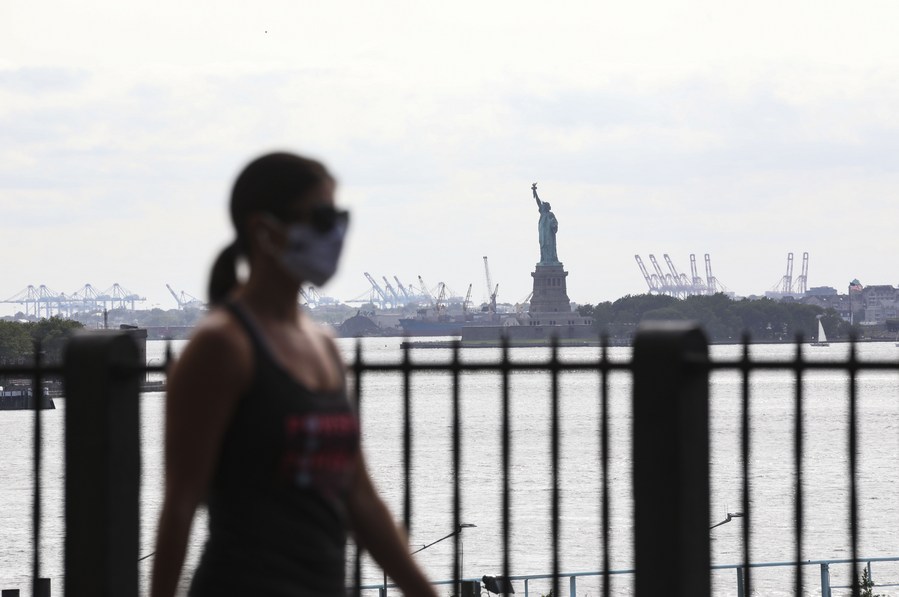
A man jogs near the Lincoln Memorial Reflecting Pool in Washington, D.C., the United States, July 8, 2020. (Xinhua/Liu Jie)
"The economic costs of the crisis are being borne disproportionately by the poor and vulnerable, bringing into stark relief deep inequities that have long afflicted the U.S.," say the IMF staff.
WASHINGTON, July 17 (Xinhua) -- U.S. output is expected to contract by an annualized rate of 37 percent in the second quarter and by 6.6 percent for 2020 as a whole, the International Monetary Fund (IMF) staff said on Friday, after concluding an annual Article IV review of the U.S. economy.
The longest economic expansion in U.S. history has been derailed by the unanticipated advent of COVID-19, with the poorest households facing "particularly precarious prospects," according to the concluding statement, which describes the preliminary findings of IMF staff at the end of an official staff visit.
"The economic costs of the crisis are being borne disproportionately by the poor and vulnerable, bringing into stark relief deep inequities that have long afflicted the U.S.," the IMF staff said.
"The pandemic has also underscored some of the structural shortcomings of the U.S. health system whereby the provision of healthcare is fragmented, decentralized, predominantly employer-based, at high cost, and with a significant share of low-income households lacking coverage," they continued.

A woman walks in a park in Brooklyn Borough of New York, the United States, on July 16, 2020. (Xinhua/Wang Ying)
The nature of the pandemic has created particularly large strains for labor intensive, face-to-face services and the unemployment rate among lower income households, that have few financial buffers, "is expected to remain high," according to the statement.
Noting that U.S. policymakers acted "quickly and assertively" to protect livelihoods and businesses and to mitigate the lasting economic costs of the pandemic, the IMF staff said there are "tremendous uncertainties" surrounding the economic propagation of the COVID-19 shock.
"The principal risk, and one that is the most difficult to quantify, is that a resurgence in the number of COVID-19 cases in the U.S. could lead to renewed, partial shutdowns in order to preserve lives, particularly of vulnerable populations," they said.
There are already urgent warning signs that the depth of the economic contraction and the sectoral distribution of economic losses will lead to a "systemic increase in poverty," adding to macro risks, they continued.
The IMF staff also noted that the significant increase in debt levels gives rise to important vulnerabilities. General government debt is expected to rise to 160 percent of GDP by 2030 even without further rounds of fiscal stimulus, and job losses and income declines will lead to increased household indebtedness, they said, adding that corporate debt has already increased above the already-high pre-pandemic levels.

People have fun at Pacifica beach in San Mateo County, the United States, June 1, 2020. (Photo by Li Jianguo/Xinhua)
"Further policy efforts will be needed to counter the pandemic and also address a range of deep-rooted social and economic challenges that continue to afflict the U.S.," according to the statement.
Prior to the pandemic, even after a decade-long expansion, the United States faced troubling social and economic outcomes related to poverty; inequalities of opportunity and declining socioeconomic mobility; an increasingly polarized income distribution; rising barriers to trade and foreign investment; and an unsustainable upward path for public debt, the IMF staff noted.
In order to tackle the consequences of the pandemic and addressing the existing problems, the U.S. government should roll out a further round of fiscal measures in the coming months that "boost demand, increase health preparedness, and support the most vulnerable."
Fiscal measures that should be considered, according to the IMF staff, include: investing in public health; supporting poor families; boosting household income; labor market policies; incentivizing investment; boosting consumption; supporting state governments; improving education opportunities; infrastructure investments.
The IMF staff also urged U.S. government to make efforts to reverse existing trade restrictions and tariff increases while working with partner countries to address policies that distort trade flows and investment decisions. ■



